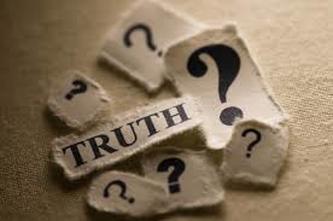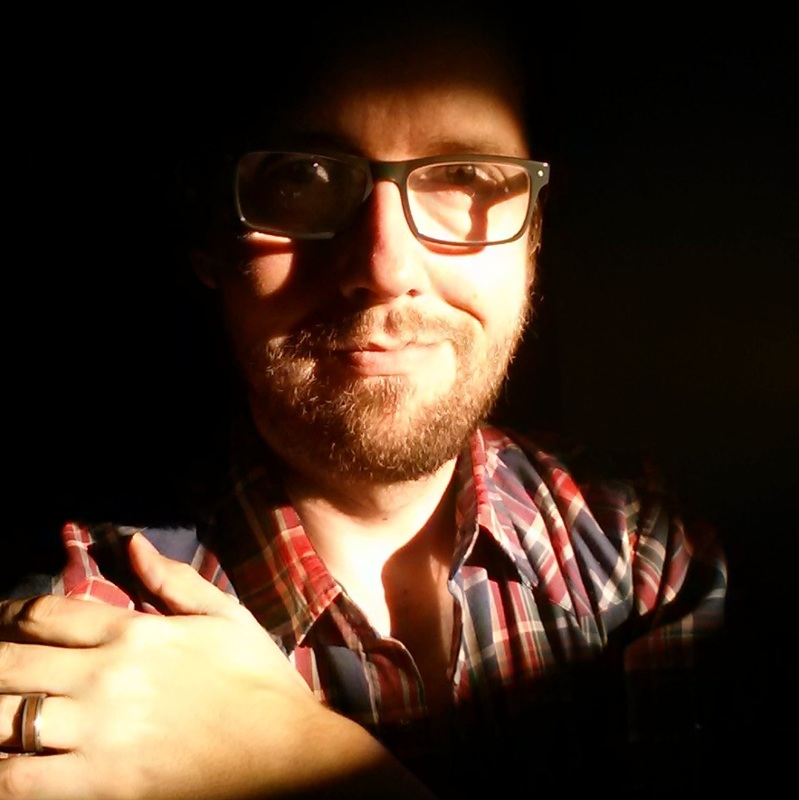One of the hardest things in this world is to convince someone of a truth they don't believe in; one of the other hardest is to convince someone that their truth is a lie. Part I: On the stageThat is all in response to my friend and fellow playwright Sarah Bowden prompting her Facebook friends for our thoughts on the importance of being honest in writing. This is what I typed in the comments:  Truth, to me, is about trust of information. If I believe what you're telling me is true, I react to it based on that. If I later learn that you lied to me about that thing, I see that moment in a new light, I see you in a new light, and I further question every subsequent interaction until I believe trust is restored. Truth is more about perception and belief on the receiver's end than anything. What I believe to be true and what IS true can be very different things. With that in mind, in a play, I follow the playwright's lead and decide what to believe based on how the story is presented. Obviously, in a play we set things up and we subvert expectations. At some point, I determine, as an audience member, whether the narrator is reliable. A reliable narrator can subvert my expectations and give me a perception shift, and still be truthful to me. Just because I see the play differently after a perception shift doesn't mean I've been lied to. However, if the playwright "lies" to me --- and I cannot reconcile the perception shift with what I've already experienced, and I then believe it's not a shift, but that everything before that moment was a "lie" and erases the experience I just had, then I lose trust in the playwright and I lose all emotional investment. It's a betrayal. Just like with a person. So, yeah, it's important to be honest in writing, just as in life. It doesn't mean we can't subvert expectations or create reveals and perception shifts that rely on slight of hand. It's just creating an understanding of when you're doing slight of hand and when you're on the level, so I know what to expect of the experience. I expect plays to use slight of hand, but I expect them to be honest about it and so when I go back, the end makes sense with what I've seen. If one part of the play creates falsity in another part, if it invalidates it and that invalidation is not explained as part of the perception shift, then it's not honest anymore and my experience is marred. It's like getting to the end of a magic trick and instead of being amazed, you feel conned. I blindly assumed the class that sparked this post was on playwriting and hurriedly typed out the above. Sarah thanked me and specified that they were talking more about essays and speeches in her comp class, asking about why people "follow writers," and "how [writers] specifically draw us into their perspectives to prove a point." With that in mind, I hurriedly typed the following: Part II: Another kind of stageFor speeches and essays that move people, I think that honesty plays out in the examples and info presented. In that type of writing, we use facts to back up opinion. If those facts are later determined to be lies, then the opinion is potentially invalidated. Obviously, speech writers carefully craft the facts to include the ones that help them win their argument and downplay those that don't. These days, if your essay or speech is full of lies, it's pretty easy for someone to discredit you and devalue your opinion by showing everyone the lies (pretty much the job of political pundits right now). One of the hardest things in this world is to convince someone of a truth they don't believe in; one of the other hardest is to convince someone that their truth is a lie. Often, we follow writers and speeches that speak "truths" to us that we already believe, that we can rally behind; and the opposite is true. If we hear something that we don't believe, even if it is scientific fact, we disengage; we lose trust in the speaker, we lose respect for them. Now, that "liar" has an uphill battle. That speech is tanking. To combat that, as writers, we have to first identify with the audience, to find truths that our audience believes, and we speak to those truths. Get them nodding. Get them smiling. Get them to say "Yeah! That's right! That's so true!" We get them to admit that everything we just said is truth and get them all rallied behind us, and then once they are totally enthralled, we correlate something they don't believe to the truth. To their truth. And now, they can't deny the new truth, because to do so would invalidate their other existing truths ---- so the writer has either convinced them of the new truth, or has convinced them that they didn't know the truth at all. Either way, a paradigm shift has just occurred. The truth has changed. In a strange twist, you have to be honest to change the truth --- because if you change the truth with lies, then when the lies are exposed, the truth changes back and you've accomplish nothing. I then apologized for monopolizing her comment feed with my soapboxing. She responded: NEVER APOLOGIZE. And something about cheesecake. Sage advice. Also, I feel like "The truth has changed" is going to become a tagline on one of my future plays. Thanks, Sarah for an intriguing lunchtime topic!
I've failed at stuff before. We all have. We don't like to talk about it, and there's this massive stigma against failing that is stomped into us from an early age, but why is that? Why are we told from day one that if we do something for the first time and do it badly that we've failed at it? Here's some Friday food for thought I gleaned from Sara Blakely, the CEO of Spanx, as she explains in a concise 95 second video (shared below): Failure isn't trying something and not doing well; failure is never trying it at all. So for a second, I'm thinking, 'hey, I know that -- that's not new.' Because like I said, I've failed at stuff before, and for a long time I've been the 'don't be afraid to fail' type --- go out there, try, fail, fall, get back up, try again. Except maybe I've been putting the word fail in the wrong place. If I try something and I suck at it, why is THAT failing? How many things are we brilliant at right out of the gate? My first few plays weren't awesome. They were far from it; I mean, I cringe when I read the dialogue and story structure I was churning out 15 years ago. Yet, I never considered them failures. Were they badly written? Yes; but I learned from them. I learn from every scene I write, every scene I read, every play I watch, every story I tell. I learn. I get better. That's the point, right? But there are tons of things I've never tried because I was so worried that I'd be bad at them. Worried I would fail. Sport comes to mind. I don't play sports. I watch them. I understand them. But when I was younger, I was convinced I'd fail on the field, so I didn't try. This past year, I started working out with a trainer, as part of group. And there were times where we played basketball, and I was almost reluctant to try; because I convinced myself at some point that I am not good at sports. I was afraid of looking ridiculous and doing poorly and losing. Of failing. Luckily, my trainer and my workout pals were encouraging and supportive (and some of them had the same anxiety) and so we played. And we were awful. And we played some more. And we were less awful. And we had fun. I had fun. Sara Blakely offers us a lovely philosophy that all too often can get lost or pushed aside. Even if we attempt something and we're awful at it, we can learn and try again and get better at it, or we figure out that there's something else we can do. Either way, we tried. And by trying, we didn't fail. It's a great concept because no one is great at everything, but fear of failure keeps so many of us from even trying in the first place to find out what's possible. I've failed at stuff before... not because I couldn't do something, but because I was too afraid to try. What have you been putting off because you're afraid to fail at it? Auditioning for that play? Writing that script? Going back to school? Taking cooking lessons? Applying for that job? Working out? Learning a new language? Whatever it is --- make the attempt. You won't fail if you try. Here's Sara's take on it. Watch it. Think about it. Live it. |
Jeremy's blog
Thoughts. From my brain. Anything to do with how we tell stories and the stories we tell each other. Literally and figuratively. About JeremyWriter. Husband. Father. Effulgent dreamer. A Fightin' Irishman (@NDdotEDU '01). A playwriting Bobcat (MFA in Playwriting, @OhioU '13). I write plays. I'm a geek. I wanted to be an astronaut. I go places in my head.
Categories
All
Archives
January 2022
|


 RSS Feed
RSS Feed
